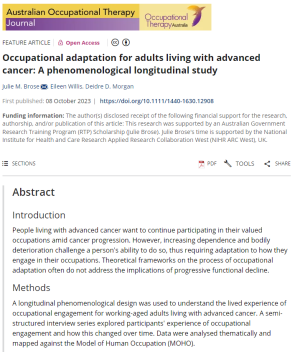Motivation and environment key to maintaining activity in advanced cancer
18 October 2023
The motivation behind the doing – what motivates people to do certain things while living with advanced cancer – is more important to them than their sense of competence in daily life. A research paper published in the Australian Occupational Therapy Journal found that motivation and environment played a central role in how people living with advanced cancer adapt to keep engaging with activities they see as valuable.
People living with cancer often experience a steady decline in their ability to function in their final year of life. This means they may find it increasingly more difficult to engage with various activities they may have enjoyed or that may have been part of their routine in the past, such as work or hobbies.
Researchers wanted to understand the experiences of working-age adults living with advanced cancer in terms of occupational engagement and adaptation. To do this, they interviewed eight adults (40–64 years old) over a period of 19 months. Throughout the study they used the term ‘occupation’ to mean everything that occupies a person’s time. They used the term ‘occupational adaptation’ to describe how people adapt how they carry out daily activities after experiencing something challenging.
Study findings showed that volition, what motivates people to keep doing things as their life is coming to an end, among their interviewees was closely related to their valued roles of parent, spouse, friend, or worker. Volition, alongside the environment a person found themselves in, played a more central role in occupational adaptation than feelings of occupational competency.
Dr Julie Brose, lead author, said:
“Our paper argues that being competent in your daily activities is not the goal of adapting how you do them towards the end of your life. This is because having a stable sense of competence while living with advanced cancer isn’t possible, as your ability to carry out these activities is likely to keep deteriorating.
“Instead, we found that the motivation or reason why a person carries on doing them is more relevant. People intentionally chose to participate in activities related to their valued roles or interests. This often relates to little things like being present to take part in everyday tasks with your children or spending time with friends and family.
“Environmental barriers can also significantly impact what a person can do. For example, steps might prevent a person who relies on a wheelchair getting around. The environment prevents them from doing what’s important to them, like going out of the house to meet a friend for coffee.
“Our paper argues that we need to look at what is important to people at end of life to help them adapt and keep doing what’s important to them. This can mean adapting not only how they do things but also removing any environmental barriers. This can then facilitate a sense of meaning at end of life.”
Paper
